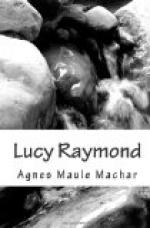Alick had come to Ashleigh as soon as possible after his uncle’s death, and was anxious to take his mother at once to the new home he had been preparing for her. As to Lucy, there seemed to be but one course advisable. As Mr. Raymond could leave only a very slender provision for his family, he had always been anxious that Lucy should have an education sufficiently thorough to put her in a position to gain her own livelihood by teaching, and a way seemed opened for her to carry out his wishes in this respect. Mr. Brooke, urged thereto by his daughter Stella, had written to Mrs. Steele, offering to receive Lucy into his own family for the next two or three years, in order to give her the advantage of a first-class education, which was, he remarked, “the best he could do for her, as it would give her the ability to do for herself.”
Lucy shrank from the prospect of so long a residence in a home so unlike the one she was leaving, as from Stella’s remarks she felt sure it must be. But to go with Harry to live with Mrs. Steele and Alick, as they kindly invited her to do, in case she could not make up her mind to go to Mr. Brooke’s, would, she felt, be imposing far too great a burden on Alick’s kindness, though it seemed just the right home for Harry. Fred, who had been summoned from college to his father’s deathbed, must return to resume his theological studies, for they all insisted that he should not think of giving up the career which had been his father’s desire for him as well as his own. The more Lucy thought about the matter, the more distinctly she saw that there was no other way rightly open to her, especially as, even could she think it right to accompany Mrs. Steele and Alick, she could not, in the new village in the West, expect any educational advantages. But it was with much reluctance, and after many prayers to be strengthened to meet the new experiences before her, that she gave her decision to go to live for the present in her Cousin Stella’s home.
Fred, to whom she confided her extreme shrinking from venturing into an atmosphere which her fancy pictured as so cold and uncongenial, endeavoured to reassure her, by reminding her of what she knew, indeed, but found it difficult to realize, that her Saviour could be as near her in the crowded city as in her quiet country home, since His love is
“A
flower that cannot die
For lack of leafy screen;”
and that it was a sickly Christianity which must necessarily fade and droop when removed from the atmosphere in which it had been originally nurtured.
“Well,” she said at last disconsolately, “it doesn’t matter so very much. I can never be very happy again, now papa is gone; and the best thing is to think most about the home he has gone to, and try to follow him there.”
Something of this kind she wrote to her old friend and teacher, Mrs. Harris, who had sent her a letter of loving sympathy. She smiled half sadly when she read Lucy’s disconsolate reply. Mrs. Harris had seen enough of life to know that a young heart is not permanently depressed by a first grief; and she feared for Lucy, if she should trust to the influence of sorrow alone to keep her “unspotted from the world.”




